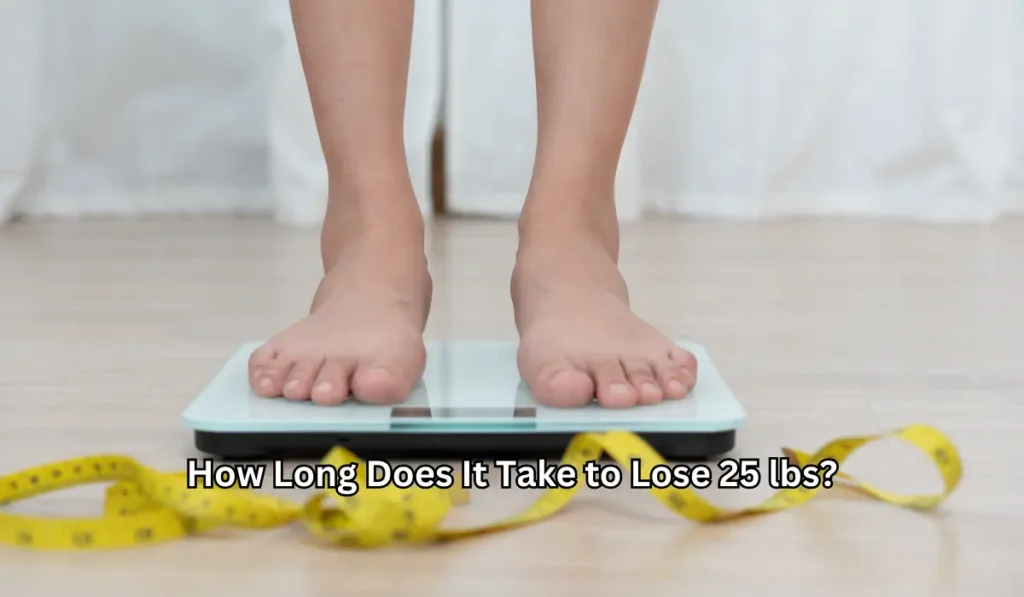
How Long Does It Take to Lose 25 lbs?
Losing weight is a goal for many people looking to improve their health and feel better about their appearance. However, one question that often comes up is, “how long does it take to lose 25 lbs?” The answer to this question is not a simple one, as it can vary greatly depending on a variety of factors, such as your current weight, diet, exercise routine, and metabolism.
In this blog post, we will dive into the topic of losing 25 lbs and explore expert answers and tips to help you reach your weight loss goals. We will examine the science behind weight loss, discuss the importance of setting realistic expectations, and provide practical advice on how to achieve sustainable results. Whether you’re a seasoned dieter or just starting your weight loss journey, this post will provide valuable insights to help you succeed.
So, how long does it take to lose 25 lbs? Join us as we explore this question and more, and discover the most effective methods to reach your weight loss goals.
Read about Chadwick Boseman Workout
Factors Affecting Weight Loss
Factors affecting weight loss can vary from person to person and can play a significant role in determining how quickly or slowly you lose weight. Understanding these factors can help you create a realistic weight loss plan that fits your lifestyle and goals. Here are some of the most common factors that can impact your weight loss journey:
- Age: As you get older, your metabolism naturally slows down, making it harder to lose weight.
- Sex: Men tend to have more muscle mass and a higher metabolism than women, which can make it easier for them to lose weight.
- Starting weight: The more you weigh, the more calories you burn, so those with a higher starting weight may lose weight more quickly.
- Metabolism: Your metabolism is the rate at which your body burns calories, and it can be influenced by factors such as genetics and thyroid function.
- Activity level: Regular exercise can help boost your metabolism and burn more calories, making weight loss easier.
- Diet: What you eat can have a significant impact on your weight loss journey. A balanced diet with plenty of whole foods and lean protein can help you lose weight while still feeling satisfied.
By considering these factors, you can create a weight loss plan that is tailored to your individual needs and goals, setting you up for success in your weight loss journey.
The Science of Weight Loss
Understanding the science of weight loss can help demystify the process and make it easier to create a plan that works for you. At its core, weight loss is about creating a calorie deficit – that is, burning more calories than you consume. Here are some of the key principles of weight loss:
- Calories: A calorie is a unit of measurement for energy. To lose weight, you need to consume fewer calories than you burn. This can be achieved through diet, exercise, or a combination of both.
- Macronutrients: The three macronutrients – protein, carbohydrates, and fat – all play important roles in weight loss. A balanced diet that includes all three macronutrients can help you feel satisfied while still creating a calorie deficit.
- Exercise: Regular exercise can help you burn more calories, boost your metabolism, and preserve muscle mass while losing weight.
- Metabolism: Your metabolism is the rate at which your body burns calories. Factors such as age, sex, and genetics can influence your metabolism, but you can also boost it through regular exercise and strength training.
- Sleep: Getting enough sleep is important for weight loss, as lack of sleep can disrupt hormones that regulate hunger and satiety.
By understanding the science of weight loss, you can create a weight loss plan that is based on evidence and tailored to your individual needs and goals. Remember that weight loss is a journey, and that sustainable progress takes time and effort.
Setting Realistic Expectations
Setting realistic expectations is a crucial part of any successful weight loss plan. It can be tempting to aim for rapid weight loss, but this approach is often unsustainable and can even be harmful to your health. Here are some tips for setting realistic expectations:
- Be patient: Sustainable weight loss is a gradual process. Aim to lose 1-2 pounds per week, rather than trying to lose a large amount of weight in a short period of time.
- Focus on progress, not perfection: Don’t beat yourself up if you slip up or don’t meet your goals right away. Celebrate small victories along the way and focus on progress, not perfection.
- Set achievable goals: Break your weight loss goal into smaller, more achievable goals. For example, aim to lose 5 pounds in the first month, rather than trying to lose all 25 pounds at once.
- Find a plan that works for you: There is no one-size-fits-all approach to weight loss. Find a plan that fits your lifestyle and preferences, whether that’s a low-carb diet or a plant-based eating plan.
- Don’t compare yourself to others: Everyone’s weight loss journey is unique. Focus on your own progress and don’t compare yourself to others.
By setting realistic expectations, you can create a weight loss plan that is sustainable and achievable. Remember that weight loss is not just about reaching a number on the scale – it’s about creating a healthier, happier you.
Read about Effective Upper Glutes Workout

Practical Tips for Losing 25 lbs
Losing 25 lbs may seem like a daunting task, but with the right strategies and mindset, it can be achievable. Here are some practical tips for losing 25 lbs in a healthy and sustainable way:
- Create a calorie deficit: To lose weight, you need to burn more calories than you consume. Aim to create a calorie deficit of 500-1000 calories per day to lose 1-2 pounds per week.
- Eat a balanced diet: Focus on eating whole, nutrient-dense foods, such as fruits, vegetables, whole grains, and lean protein. Avoid processed foods and sugary drinks, which can contribute to weight gain.
- Practice portion control: Use smaller plates, measure your portions, and be mindful of your hunger and fullness cues to avoid overeating.
- Stay hydrated: Drinking plenty of water can help you feel full and may even boost your metabolism.
- Exercise regularly: Aim for at least 150 minutes of moderate-intensity exercise per week, such as brisk walking, cycling, or swimming. Strength training can also help preserve muscle mass while losing weight.
- Get enough sleep: Aim for 7-9 hours of sleep per night to help regulate hormones that control hunger and satiety.
- Manage stress: Stress can trigger emotional eating and sabotage your weight loss efforts. Practice stress-management techniques, such as deep breathing or meditation, to help manage stress.
By implementing these practical tips, you can create a healthy and sustainable plan for losing 25 lbs. Remember to be patient and focus on progress, not perfection. With consistent effort and a positive mindset, you can achieve your weight loss goals.
Tracking Your Progress
Tracking your progress is an important part of any weight loss journey. It can help you stay motivated, identify areas for improvement, and celebrate your successes. Here are some tips for tracking your weight loss progress:
- Weigh yourself regularly: Weighing yourself once a week can help you track your progress and stay accountable. However, remember that weight can fluctuate due to factors such as water retention, so don’t get too hung up on the number on the scale.
- Take measurements: Measuring your waist, hips, and other areas can provide a more accurate picture of your progress than just weighing yourself. Take measurements once a month to track changes in your body composition.
- Keep a food journal: Writing down what you eat can help you identify areas for improvement and make healthier choices. Use a food journal or app to track your meals and snacks.
- Use technology: There are many apps and devices that can help you track your progress, such as fitness trackers or calorie-counting apps. Find one that works for you and use it consistently.
- Celebrate your successes: Don’t forget to celebrate your progress along the way, whether that’s fitting into a smaller size jeans or running a 5K. Celebrating your successes can help keep you motivated and focused on your goals.
By tracking your progress, you can stay accountable and motivated on your weight loss journey. Remember to focus on progress, not perfection, and to be kind to yourself along the way.
Staying Motivated
Staying motivated is key to achieving your weight loss goals. However, it’s not uncommon to experience setbacks or plateaus along the way. Here are some tips for staying motivated:
- Find your why: Identify your reasons for wanting to lose weight, whether that’s to improve your health, feel more confident, or set a positive example for your children. Keeping your why in mind can help you stay focused and motivated.
- Set goals: Setting specific, achievable goals can help keep you motivated and on track. Write down your goals and review them regularly.
- Surround yourself with support: Having a support system can make a big difference in staying motivated. Surround yourself with people who encourage and support your weight loss journey.
- Reward yourself: Celebrate your successes along the way with non-food rewards, such as a new outfit or a massage.
- Mix up your routine: Trying new exercises or recipes can help keep your weight loss journey fresh and exciting. Don’t be afraid to step outside of your comfort zone.
- Stay positive: Focus on progress, not perfection. Celebrate small victories and don’t beat yourself up over setbacks.
Remember that weight loss is a journey, and it’s normal to experience ups and downs along the way. By staying motivated and focused on your goals, you can achieve long-term success.

Overcoming Plateaus and Challenges
Overcoming plateaus and challenges is a common part of any weight loss journey. Here are some tips for staying on track:
- Mix up your routine: If you’ve hit a plateau, try changing up your exercise routine or trying new healthy recipes. This can help shake things up and get you back on track.
- Increase your activity level: If you’ve been sedentary, try increasing your daily activity level by taking the stairs, going for a walk, or doing some light stretching.
- Revisit your goals: Take some time to revisit your weight loss goals and make sure they are still realistic and achievable. Adjust them if needed.
- Address emotional eating: Emotional eating can be a major barrier to weight loss. Practice stress-management techniques, such as meditation or deep breathing, to help manage stress and avoid emotional eating.
- Get support: Consider joining a support group or working with a registered dietitian or personal trainer to help you stay accountable and overcome challenges.
- Don’t give up: Remember that setbacks are a normal part of the weight loss journey. Don’t beat yourself up if you slip up or don’t see progress right away. Stay focused on your goals and keep moving forward.
By being proactive and staying positive, you can overcome plateaus and challenges and achieve your weight loss goals. Remember to celebrate your successes along the way and be kind to yourself, even during difficult times.
Conclusion
In conclusion, the journey to losing 25 lbs can be challenging, but it is achievable with the right mindset and strategies. By understanding the factors that can impact weight loss, setting realistic expectations, and implementing practical tips for creating a calorie deficit and staying motivated, you can successfully reach your weight loss goals. It’s important to remember that sustainable progress takes time and effort, and there may be setbacks along the way. But by staying focused on your goals and celebrating your successes, you can overcome challenges and achieve long-term success. If you’re wondering “how long does it take to lose 25 lbs”, remember that the answer varies depending on individual factors, but with consistent effort and dedication, you can achieve your weight loss goals and improve your health and well-being.